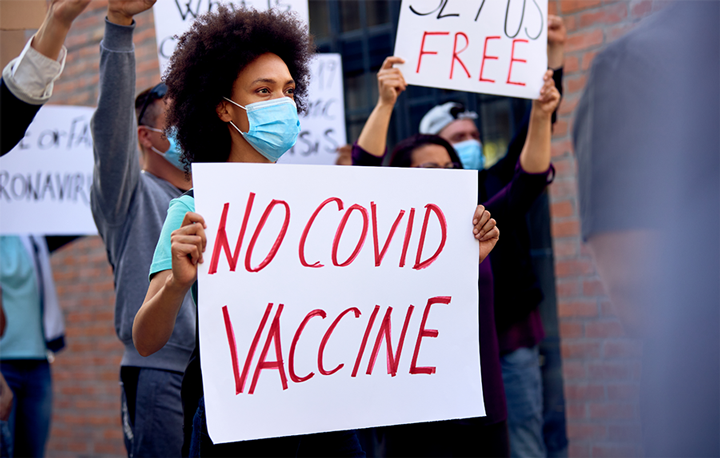With the COVID-19 pandemic raging on, millions of Americans listened to public health and science experts and stayed home for Thanksgiving, didn’t travel, and didn’t participate in large family gatherings. Unfortunately, millions of other Americans did do all those things, stretching the threat of an uncontrollable virus to even farther corners of the country.
While we do not yet know how much Thanksgiving will contribute to the spread of COVID, data from the Transportation Security Administration (TSA) revealed more than one million air travelers were screened right before Thanksgiving and 1.17 million people were screened the Sunday after the holiday, which was the highest volume TSA has seen since the pandemic begun.
Moreover, according to the American Automobile Association (AAA), nearly 50 million people were projected to have traveled in total during the Thanksgiving holiday. While this would represent a decline from years past, it’s considerably high for a pandemic, especially as numbers are surging across the country, leaving hospital ICUs at capacity in numerous states.
Since March, public health officials across the U.S. have been adamant that people stay home unless absolutely necessary, wear masks in public and ultimately have faith in a system that is set to widely distribute multiple vaccines by next year. Yet, during the worst outbreak in a century, trust in public health and science is not guaranteed, nor is it certain that people will heed their advice. For instance, approximately 30 percent of Americans said before Thanksgiving they planned on ignoring public health warnings about traveling for the holiday.
“The message people are sending is, ‘It’s not going to happen to me. I’m not going to get COVID and if I do get COVID, I will be OK, and I won’t die.’ That’s the mentality people seem to have,” said International Federation on Ageing (IFA) secretary general, Jane Barratt. The issue isn’t limited to the pandemic. Barratt, whose organization works in public health campaigns to combat poor vaccination rates, notes that childhood vaccinations have decreased in recent years and as a result, measles cases have increased by 556 percent globally since 2016—with the number expected to rise even higher by the time this year’s figures are tabulated.
“Once upon a time, infectious diseases like the measles were on the verge of being eliminated. Now they’ve come back. The erosion of confidence in science may not be an erosion of confidence in the public health system but in the decisionmakers. The ‘who do we trust today?’ conversation. Different leaders have responded to the pandemic in different ways and that’s made a tremendous difference,” Barratt adds.
The politics of public health
Political leaders are a major reason why the U.S. is facing a crisis in confidence when it comes to COVID vaccines and public health decrees. The country’s political division, especially after a contentious election, has seemingly engulfed everything, and the COVID-19 response is no different. One poll, from Pew Research Center, found that while 67 percent of liberal Democrats in the U.S. say they trust scientists, only 17 percent of conservative Republicans said the same. According to another Pew survey, there is a 16-point difference in how Republicans and Democrats view mask wearing.
Read more: Political tension in the workplace: CEOs must address the challenge
“There’s a pandemic, if you wear a mask, you can save your own life and maybe other people’s lives. If you don’t, more people will die. And the response has been from some people, ‘I don’t believe you.’ And it comes partly from the White House and the President of the United States telling people to not believe scientists and saying the virus will go away like a miracle,” says Diana Zuckerman, President of the National Center for Health Research.
To Barratt’s point about different leaders responding to the pandemic in different ways, she says New Zealand has been widely seen as having one of the most impressive responses to date. Researchers and experts have praised New Zealand’s Prime Minister, Jacinda Ardern, for putting science first in its decision making, providing “empathic leadership” and effectively “communicating key messages to the public.” In the U.S., the partisan divide has made having this kind of unified response nearly impossible. Throughout some areas of the country, in fact, even key health care leaders have dismissed the public health guidance on COVID-19.
Zuckerman says the Trump administration not allowing Anthony Fauci, MD, the renowned immunologist and director of the National Institute of Allergy and Infectious Diseases, to testify in Congress on the pandemic was a worrying sign in the early days of the pandemic. The disconnect between what public health experts like Fauci were saying and what was coming from the White House Task Force turned the COVID response into a political issue.
Moreover, Zuckerman says it’s alarming that non-political government agencies like Fauci’s National Institutes for Health (NIH) and the Centers for Disease Control and Prevention (CDC) have become infiltrated by political partisans on behalf of President Trump, seeking to downplay the pandemic. In October, more than 1,000 current and former CDC epidemic intelligence officers signed an open letter decrying “the ominous politicization” of the agency.
“You had a CDC director who early on was not that different from Dr. Fauci and was trying to find a compromise with the White House by educating the President and others in the administration on the pandemic, while trying very hard to not contradict the White House tweets and comments. That obviously failed and when that happened, people started making decisions for the CDC that were not scientific. That happened at FDA and NIH as well,” Zuckerman says.










